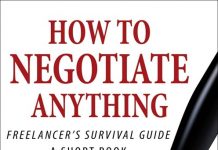 Textbook Publisher Backs Down, Won’t Force Students to Return Paper Textbook (The Digital Reader)
Textbook Publisher Backs Down, Won’t Force Students to Return Paper Textbook (The Digital Reader)
A couple days later Aspen responded to the protests with a clarification. They insist that their attempt to take rights away from students was merely one of the options a student will have for buying the next edition.
***
How Do We Address the Continuing Problem of Inadequate and Deceptive Publishing Practices? (The Scholarly Kitchen)
For 20 years, scholarly publishing has been responding to what some term “the digital revolution.” Promising an end to scarcity and delays, the technocrats — and I count myself as among these to a point — believed all the benefits of abundance and speed would only help science advance.
***
Barnes & Noble Should Rally Around, Not Retreat From, Retail Stores (Forbes)
Attention is now back on B&N’s retail operations and the brand’s stores may indeed be its saving grace.
***
No one Buys New Writers (Dean Wesley Smith)
Myths ignore facts. Myths are often beliefs built from fear or past actions.
***
Kindle Daily Deals: Rosemary’s Baby (and others)

































I’d add to this list a story that’s running on National Journal.
http://www.nationaljournal.com/tech/company-that-threatened-to-sue-negative-reviewer-just-lost-its-amazon-account-20140509
The essence is that someone posted a negative review of a Mediabridge router on Amazon and the firm threatened to sue him. The reviewer, probably unable to afford the cost of even a successful defense against their charges, removed the review along with a Redit post about the threat.
That’s when this story takes an interesting twist:
“Leaders at Mediabridge now say that Amazon has revoked the company’s seller account, preventing the sale of Mediabridge products on Amazon.com—the only site through which it currently sells its products. That might mean the loss of jobs for many of the company’s employees, the company claims.”
I just checked. As best I can tell from a quick search, Amazon is still selling Mediabridge cables but has no Mediabridge routers for sale. Maybe the Amazon block is selective. More likely Amazon returned the routers and is selling off a cable inventory it won’t replace.
Those who know me know I don’t hesitate to criticize Amazon, particularly when it tries to bully authors and publishers. In this case, I happen to like what seems to be its anti-bullying stance. As a writer, I don’t like negative reviews, but I regard reviews at sites like Amazon as ‘no law west of the Pecos’ zones. I’d rather have free-wheeling reviews that get out of line than lawyers sending out nasty cease and desist letters. Let customers sort out the fair reviews from the unfair ones.
Of course, this story has two sides. It’s good that Amazon, perhaps because it wants to protect its free-wheeling reviews, is taking an anti-bullying stance. But it’s also true that Amazon has yanked what are probably this company’s most profitable products from their store. That has two lessons for authors and publishers:
1. Never sell through just one retailer, even the largest. You become too dependent on them. Go with virtually every retailer you can. Some other retailers pay better royalties than Amazon, so encourage your readers to buy from them.
2. For ebooks, losing an Amazon ebook listing means losing where perhaps 70% of your sales take place. That doesn’t mean you lose 70% of your sales. Some readers will look for your ebooks elsewhere. But it does mean that the current Amazon-dominated market is a most unhealthy one and one that’s being rendered all the more unhealthy by a DOJ that’s going after almost everyone but Amazon, particularly Apple, Amazon’s only effective competitor in the ebook market.
You and I won’t be able to do much about the DOJ until next November and even then is seems unlikely the Republicans will pay much attention to the distortions of the ebook market. Washington is caught up in much larger issues. Both parties seem to only listen to the deep-pocketed lobbyists on K Street.
We’ll just have to look out for ourselves. Release your books everywhere. Encourage your readers to get in the habit of shopping at several sources.
–Michael W. Perry, Lily’s Ride: Rescuing her Father from the Ku Klux Klan
The real problem with Barnes & Noble retail stores is they don’t carry the books I want to read. Sure, I’ll read contemporary fiction like the recent Booker prize novel, non-fiction, and (real) science fiction, but I tend to stay away from the meat and potatoes of bestsellers, vampires, series, and YA.
The selection at my local Barnes & Noble was kind of thin. Just last week I had time to kill waiting for someone and spent it at B&N. There was nothing – NOTHING – in the science fiction section I would have taken home to read. Calling it a science fiction section is probably a misnomer – it was just about all Fantasy except the two shelves of David Webber (and once you’ve read one Webber you’ve read them all) and a smattering of “Sci-Fi” adventures. I didn’t bother with the wall of Star Wars/Star Trek tie-ins. The history section was thin too. I suppose they needed the space for the BOOKS FOR TEENS display. I didn’t have the time to browse the literature section and I’m pretty sure they had the most recent Booker and Pulitzer Prize winners.
So what do B&N stores have to offer me? Granted: I’m not a typical reader and they need to tune the store to their likely customers. But compare it with a store like Elliot Bay Books in Seattle where I can be transfixed for hours. Sure they too were heavy on Fantasy in the Science Fiction section (a signs of our time) but at least they had a deeper selection, and the literature area was great.
Go away, B&N, go away. Maybe someone else needs you, but I don’t.